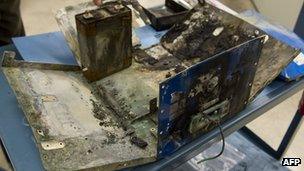Dreamliner crisis: Boeing seeks test flight for 787
- Published

Safety regulators in the US and Japan have been probing the battery used in 787 Dreamliners
Boeing has sought the permission of the US Federal Aviation Administration (FAA) to conduct test flights of its 787 Dreamliner passenger plane.
All 50 of Boeing's 787s were grounded last month because of an ongoing investigation into battery problems.
A battery on a Japan Airlines 787 caught fire, and a malfunction forced an All Nippon Airways flight to make an emergency landing.
Some analysts said this suggests Boeing may be closer to resolving the issue.
Peter Conte, a spokesman for Boeing, told the BBC that the firm's application was "under evaluation" by the FAA.
Aerospace analyst Chris de Lavigne of consulting firm Frost & Sullivan said it was highly likely that the authorities would grant the plane manufacturer permission.
"This is a clear indication that Boeing has identified the problem and may even have found a solution," he said.
"The logical step is to conduct test flights and see if the solution does work."
Unique problems?
The incidents on the Japan Airlines (JAL) and All Nippon Airways (ANA) planes prompted authorities in both the US and Japan to launch inquiries to try to find out what caused the battery problems.
However, Japan's transport ministry said that safety inspectors had found no faults with the battery.
At the same time, Boeing, which launched its own investigation into the issue, also defended the battery being used on the plane.
"Nothing that we have learned has told us that we have made the wrong choice on the battery technology," Jim McNerney, Boeing's chief executive, said last week.
That had led to concerns that the planes might remain grounded for a while pending possible further investigations to sort out the issue.
Boeing, which has orders for more than 800 Dreamliners, has cancelled the deliveries of planes in the wake of the battery problems.
Some analysts said that Boeing's request to start test flights may be a way for them to establish that the battery issues that impacted the JAL and ANA flights may have been unique to those two planes.
"This would provide them an opportunity to get these planes back in the air and show that the systems and the reasons behind the safety certification of the 787 still stand," Siva Govindasamy of Flightglobal told the BBC.
"They may be wanting to point to the authorities that the overall 787 programme is safe."
However, Mr Govindasamy added that this may not be enough to convince the authorities and Boeing's customers.
"The regulators may want more rigorous tests before they allow the planes to take off.
"And the customers, as well as passengers, will need to be fully satisfied that the issue has been resolved before they start to fly the 787s again," he explained.
- Published17 January 2013
- Published31 January 2013